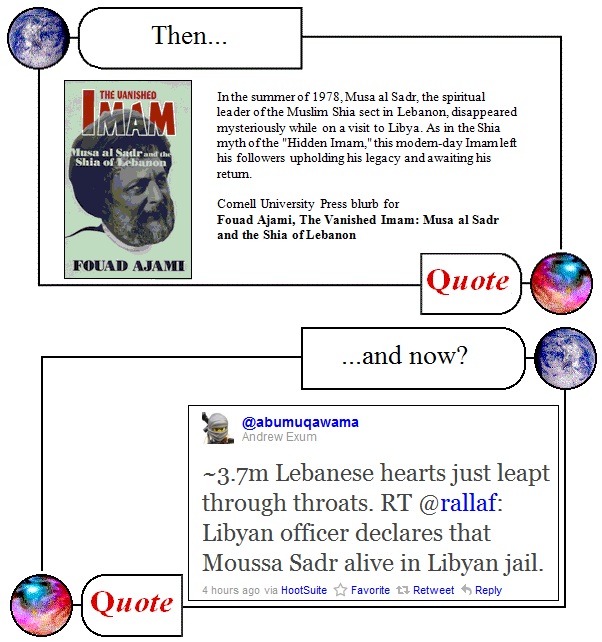As for me, I prefer to live (as best i can) by the Beatitudes, and under the US Constitution and Bill of Rights.
Religion
DARPA, STORyNet and the Fate of the War by J. Scott Shipman
[Cross-posted from zenpundit.com]
J. Scott Shipman, the owner of a boutique consulting firm in the Metro DC area that is putting Col. John Boyd’s ideas into action, is a longtime friend of zenpundit.com and Chicago Boyz and an occasional guest-poster. Scott has an important report regarding the “war of ideas” against the Islamist-Takfirist enemy in Afghanistan after attending a workshop hosted by DARPA.
DARPA, STORyNet and the Fate of the War
by J. Scott Shipman
I had the opportunity to attend a DARPA workshop yesterday called STORyNet. The purpose was to survey narrative theories, to better understand the role of narrative in security contexts, and to survey the state of the art in narrative analysis and decomposition tools (see below):
Return of the Vanished Imam?
This is the second of two posts dealing with less widely-known figures in the Middle East who may yet have significant impact, at a time when most media focus is on nations and rulers rather than on religious figures who have been locked away in prison for years…
[ cross-posted from Zenpundit ]
Fouad Ajami’s The Vanished Imam: Musa al Sadr and the Shia of Lebanon was among the first books I read about matters Islamic, and the close parallel between the vanishing of Musa al-Sadr and the vanishing — or, more properly speaking, Ghayba or occultation — of the Twelfth Imam or Mahdi struck me forcibly at the time.
I don’t have my copy to hand, so I can’t tell how strongly Ajami himself made the comparison — but I was certainly not alone. Daniel Pipes, in his review of Ajami’s book writes:
What made the Imam’s vanishing so significant is that it exactly fit the millennial expectations of Shiism, a faith premised on the disappearance of righteous leaders and their reappearance at the end of time.
And now it may be — the report has yet to be confirmed — that Imam Musa is back among us.
@rallaf is an Associate Fellow at London’s Chatham House.
*
The mind sees one thing, which reminds it of something else. It’s the oldest trick in the book, and it depends on the recognition of pattern, or you might say, parallelism.
The return of Imam Musa would be significant not merely for his admirers, not only for what he might have to say or what role — now aged 82, after 30 years in prison — he might yet play, but also, I suspect, for the vivid premonition of the Mahdi his return might stir…
Will Dr Fadl retract his Retractions?
This is the first of two posts dealing with less widely-known figures in the Middle East who may yet have significant impact, at a time when most media focus is on nations and rulers rather than on religious figures who have been locked away in prison for years…
[ cross-posted with a minor update from Zenpundit where it appeared a week ago ]
*
Sayyid Imam al-Sharif, popularly known as Dr Fadl, wrote two of the key works of jihadist ideology, The Essential Guide for Preparation and the thousand-page Compendium of the Pursuit of Divine Knowledge, in the late 1980s — thereby providing his friend from student days, Ayman al-Zawahiri, with powerful scholarly backing for the doctrines of militant jihad and takfirism. Lawrence Wright refers to Fadl as an “Al-Qaeda mastermind” in a detailed 2008 New Yorker analysis.
Dr Fadl was imprisoned without trial in the Yemen shortly after 9/11, but it was after he had been transferred to an Egyptian prison in 2004 that he wrote Rationalizing Jihad, the first volume of his “retractions” — a work so powerful in its attack on his own earlier jihadist doctrine that al-Zawahiri felt obliged to respond with a two-hundred page letter of rebuttal. A second volume from Dr. Fadl followed more recently.
Here’s the point: as far as we (the “open source reading” public) know, Dr Fadl remains in Tora Istikbal prison in Egypt, and thus far it has been possible for Al-Qaida and others to argue that his “retractions” were the result of coercion.
*
In recent days, however, Egypt has been in considerable flux.
There were reports before the fall of Mubarak of prisoners being liberated or escaping from prison — either as part of the revolution, or alternatively to supply Mubarak with groups of paid thugs who could attack the demonstrators. More recently, the freeing of political prisoners has been one of the demands the demonstrators have made of the military, and it is here that Robert Fisk’s report in The Independent today fits in:
As for the freeing of political prisoners, the military has remained suspiciously silent. Is this because there are prisoners who know too much about the army’s involvement in the previous regime? Or because escaped and newly liberated prisoners are returning to Cairo and Alexandria from desert camps with terrible stories of torture and executions by so they say military personnel. An Egyptian army officer known to ‘The Independent’ insisted yesterday that the desert prisons were run by military intelligence units who worked for the interior ministry not for the ministry of defence.
*
Every major act on the world stage has consequences that ripple out in unexpected directions.
If Dr Fadl regains his liberty, the question arises whether he will claim his critiques of jihadist dictrine were obtained by force, and effectively retract his retractions or whether he will stand by them, as I somehow expect he might — still declaring, this time as a free man, that “There is nothing that invokes the anger of God and His wrath like the unwarranted spilling of blood and wrecking of property,” and “There is nothing in the Sharia about killing Jews and the Nazarenes, referred to by some as the Crusaders. They are the neighbors of the Muslims … and being kind to one’s neighbors is a religious duty.”
*
I haven’t seen any discussion of this question in the western press, and it was only a tweeted nudge from Leah Farrall on January 31 that set me thinking about Dr Fadl, and the questions that his possible release from prison might raise.
Is he free? Will he be freed? If he is, what will he say?
Whichever tack he takes, his statements will have impact.
And as Leah points out, there are parallels between Dr Fadl’s critique of al-Qaeda and that of Abu Walid al-Masri — which just gives me further reason to be interested in what we might hear next from either one.
*
UPDATE:
On February 19th the researcher and author Evan Kohlmann @IntelTweet tweeted:
Groups of hardline jihadists have reportedly escaped from at least three Egyptian prisons: Wadi al-Natrun, Al-Tura, and Wadi al-Hadid.
As far as I know, Dr Fadl was in the "Scorpion" high security section of al-Tura / Tora.
.
I’ll update here or in a new post if I learn more.
Ethical Truth and Ethical Practices for Inviduals, Businesses and Nations, Through the Lens of Benedict XVI’s Caritas in Veritate
I gave a lecture last Fall at the Integritas Institute at UIC.
I manage to mash-up the Pope with some economics and history, and some war stories, and C.S. Lewis and I even get Hayek in there at the end.

